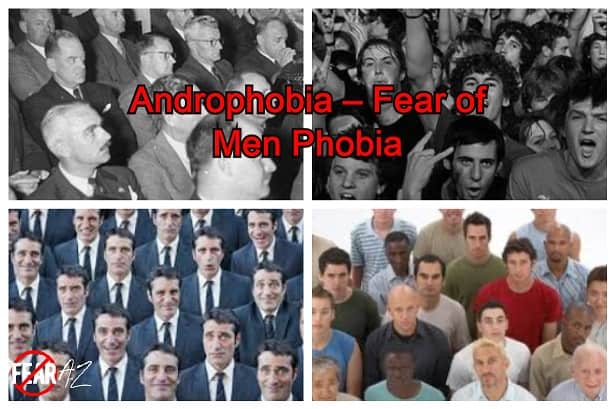Share This Article
The Excessive Fear of Men, or Androphobia
Do you tremble at the thought of talking to men? Does being in a room full of men fill you with dread?
Does the prospect of meeting up with male colleagues or even family members cause headaches, sleepless nights, or excessive sweating? Do you find it difficult to concentrate on day-to-day activities when surrounded by men? If your answer to these questions is yes, you are most likely suffering from androphobia.
This phobia may cause you to completely cut off any social contact and avoid working at places that have male employees. You might stop visiting places where you would be expected to talk to men.
Since androphobia is considered an irrational fear, it can become difficult to openly discuss your issues with someone. You might also hesitate to seek professional help, fearing judgment.
However, androphobia is not an incurable problem. With the right help and treatment, you can overcome the phobia of men. But first, it’s important to acknowledge that you have this condition.

What Is Androphobia All About?
What is androphobia? In simple terms, androphobia is defined as the phobia of men, or fear of men. Those with this phobia have an irrational and persistent fear of anyone or anything associated with the male gender.
The term is derived from the Greek words andros, meaning “man” and phobos, meaning “fear.” Some say the word androphobia can be traced back to feminist and lesbian-feminist movements. In those contexts, androphobia is a counter to the word “gynophobia,” which is defined as the fear of women.
How common is androphobia? Although it affects both men and women, women are more likely to be diagnosed with or suffer from androphobia. Moreover, younger women and girls are at a higher risk of suffering from androphobia than older females.
There are two types of androphobia. Homosocial androphobia involves men fearing other men. Heterosocial androphobia occurs when women fear men. Both of these categories of androphobia are triggered by the fear of masculinity.
Androphobia is categorized as a form of specific phobia since it is an irrational and overpowering form of fear of men. In such phobias, the object of fear may not pose an actual danger or threat. However, this extreme fear still overpowers individuals.
If not treated, androphobia may last a lifetime. Phobias can affect one’s ability to form healthy relationships and carry out daily activities.
Causes of Androphobia
It is generally believed that those who have had unpleasant and traumatic experiences with men tend to develop androphobia. In 70 percent of all cases, the individual was a victim of sexual assault by a man.
Other reasons for developing androphobia include:
- Negative experiences with men that do not necessarily indicate sexual assault
- Hearing about negative experiences with men from friends, families, or even strangers
- Abuse and neglect at the hands of men
- Seeing or reading about incidents where others, particularly women, have been abused or assaulted by men, including incidents such as domestic violence, assault, abduction, and killing of women at the hands of men
- Genetics and learned behavior from family members
- Changes to the functioning of the brain
In certain societies, women and girls are forced by social standards to stay away from men. This is done by limiting their interaction with males or instilling a sense of fear. Such females may develop androphobia even if they have not had any unpleasant or traumatic encounters with men. Even if they go on to have male friends, they can’t form healthy relationships because of a fear of male attention. Often, they feel scared of working with or being in the company of men.
Individuals who are already suffering from anxiety or depression may also be at a higher risk of developing androphobia.
Symptoms of Androphobia
Do you have androphobia? The best way to find out is to consult a mental health professional, especially if you have any of these tell-tale symptoms:
Mental/Emotional Symptoms
- Confusion
- Fear of losing control
- Difficulty in concentration
- Anger
- Irritability and quick-tempered
- Mood swings
- Feeling withdrawn and isolated
- Fear of dying
- Frequent nightmares involving men
- Erratic sleeping patterns
- Feelings of hopelessness and dejection
- An impending feeling of dread
- Inability to calm down
Physical Symptoms
- Dizziness
- Palpitations and irregular heartbeat
- Body aches
- Fatigue and weakness
- Excessive sweating
- Shortness of breath
- Frequent headaches
- Prickly sensation all over the body
- Dryness in mouth
- Increase in blood pressure
- Ringing sound in ears
Typically, an individual with androphobia will go out of their way to avoid interaction with men. They may only visit places that only have females. Some refuse to go out at all, fearing an encounter with men.
Self-Help Techniques for Androphobia
If you choose to cope with androphobia on your own, there are several ways to go about it.
- Begin by increasing your physical activity. Try yoga postures, particularly focusing on those that help to relax your muscles and mind.
- Meditation can also help to overcome androphobia. Focus on your inhalation and exhalation, along with other breathing techniques.
- Schedule rigorous physical activity daily. Examples are jogging, brisk walking, and aerobics.
- Reduce your intake of caffeine and junk food.
- Join a self-help group. You can help each other overcome your phobias by sharing your androphobia stories. Their experiences will resonate with you and provide the assurance that you’re not alone.
Seeking Professional Help
If you’re unable to treat androphobia on your own, seek professional guidance. A therapist will recommend methods to help better manage your phobia or, in some cases, to overcome it completely. Let’s look at some of these methods in detail.
Exposure Therapy
Here, a therapist will expose you to things and situations that you associate with men. In time, you’ll also be asked to interact with a man or men under supervision. Such a method works to change negative thoughts, responses, and sensations.
Cognitive Behavioral Therapy (CBT)
Under CBT, a therapist uses exposure therapy along with a host of other therapeutic techniques to desensitize you to the things or people you fear. With CBT, your therapist will help you perceive your fears in a manner different from what you typically do. This allows you to cope with the physical sensations related to androphobia.
You’ll also get input on how to tackle the emotional impact androphobia has had on your life. Ultimately, CBT will help you gain confidence in dealing with your fears.
Dialectical Behavior Therapy (DBT)
In DBT, the therapist will help you learn to control your emotions when your fear comes to mind. One way to do this is using a method called “half-smiling.” You’ll be asked to lift the corners of your mouth slightly whenever you think about men or anything masculine.
How Can You Avoid Androphobia Altogether?
If you’re having a hard time managing your androphobia symptoms, you may need to completely avoid men or masculine things. This could include staying at home or refraining from places where there is a possibility of talking to men. If you’re a student, you could try and enroll in an all-girls school or exclusive college rather than a co-educational institution. However, these measures aren’t foolproof, and the likelihood of encountering men at some point in your day or week are high.
Conclusion
Androphobia can be managed, either on your own or with professional assistance. Like other forms of phobia, it will take time to see results. With a little work, you’ll be able to interact with men with confidence.




